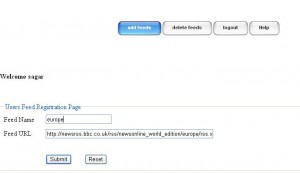In RSS Feed Reader Project in Java , we investigate one of the important challenges in building an effective RSS aggregate: How can we minimize the delay between the publication of new content at a source and its appearance at the aggregator? Note that the aggregation can be done either at a desktop (for example, RSS feed readers) or at a central server (for example, a personalized Yahoo!/Google homepage).
Although some of our developed techniques can be applied to the desktop based aggregation, in this project, we primarily focus on the server-based aggregation scenario. This problem is similar to the index refresh problem for Web search engines but two important properties of the information in the RSS domain make this problem unique and interesting.
The main functions associated with the product are described in this section of SRS. The characteristics of a user of this product are indicated. The assumptions in this section result from interaction with the project stakeholders.
Product Perspective
In this project, we investigate one of the important challenges in building an effective RSS aggregator: How can we minimize the delay between the publication of new content at a source and its appearance at the aggregator? Note that the aggregation can be done either at a desktop (for example, RSS feed readers) or at a central server (for example, a personalized Yahoo!/Google homepage). Although some of our developed techniques can be applied to the desktop based aggregation, in this project, we primarily focus on the server-based aggregation scenario.
Conclusion:
In this project, we have investigated the problems related to an RSS aggregator that retrieves information from multiple RSS sources automatically. In particular, we have developed a new RSS monitoring algorithm that exploits the non uniformity of the generation of new postings and is able to collect new data efficiently using minimal resources.

